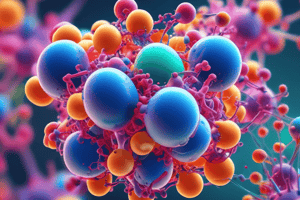Podcast
Questions and Answers
What determines the state of matter (gas, liquid, or solid)?
What determines the state of matter (gas, liquid, or solid)?
- Repulsion of like molecules
- Intramolecular forces
- Attraction of unlike molecules
- Intermolecular forces (correct)
What do cohesion forces refer to in terms of intermolecular forces?
What do cohesion forces refer to in terms of intermolecular forces?
- Neutral interaction between molecules
- Absence of intermolecular forces
- Attraction of like molecules (correct)
- Repulsion of unlike molecules
What is the role of repulsive forces in molecule interactions?
What is the role of repulsive forces in molecule interactions?
- Cause molecules to attract one another
- Prevent interpenetration of molecules (correct)
- Stabilize the system at a minimum potential energy
- Facilitate cohesive bonds
When do molecules establish equilibrium due to attractive and repulsive forces being equal?
When do molecules establish equilibrium due to attractive and repulsive forces being equal?
What type of intermolecular forces are responsible for VanderWallsForces?
What type of intermolecular forces are responsible for VanderWallsForces?
In the context of pharmaceutical sciences, which area benefits from an understanding of intermolecular forces?
In the context of pharmaceutical sciences, which area benefits from an understanding of intermolecular forces?
What type of forces are associated with the alignment of dipolar molecules so that the negative pole of one molecule points towards the positive pole of the next?
What type of forces are associated with the alignment of dipolar molecules so that the negative pole of one molecule points towards the positive pole of the next?
Which type of interaction involves permanent dipoles inducing a transient dipole in nonpolar molecules?
Which type of interaction involves permanent dipoles inducing a transient dipole in nonpolar molecules?
What force is responsible for inducing polarity in nonpolar molecules and is sufficient to bring about the condensation of nonpolar gas molecules?
What force is responsible for inducing polarity in nonpolar molecules and is sufficient to bring about the condensation of nonpolar gas molecules?
What type of forces are involved in the solubility of some drugs and the formation of metal complexes and molecular structures?
What type of forces are involved in the solubility of some drugs and the formation of metal complexes and molecular structures?
In what type of interaction does a hydrogen atom attached to an electronegative atom participate in unusually strong dipole-dipole interactions with other electronegative centers?
In what type of interaction does a hydrogen atom attached to an electronegative atom participate in unusually strong dipole-dipole interactions with other electronegative centers?
In a solution of potassium iodide, what forces account for the solubility of iodine?
In a solution of potassium iodide, what forces account for the solubility of iodine?
Flashcards are hidden until you start studying
Study Notes
Determinants of State of Matter
- State of matter (gas, liquid, solid) is determined by temperature and pressure affecting intermolecular forces.
- Increased temperature typically leads to gas state, while decreased temperature can lead to solid state.
Cohesion Forces and Intermolecular Forces
- Cohesion forces refer to the intermolecular forces that hold identical molecules together.
- Strong cohesion results in liquids maintaining a definite shape, whereas weak cohesion results in gases expanding to fill their container.
Role of Repulsive Forces
- Repulsive forces act between molecules when they come very close to each other, preventing collapse and maintaining structural integrity.
- These forces are crucial for preventing molecules from overlapping and creating stability in solids and liquids.
Molecular Equilibrium
- Equilibrium is established in a system when attractive and repulsive forces between molecules are balanced.
- At this point, molecules maintain a stable distance, preventing changes in state or structure.
Van der Waals Forces
- Van der Waals forces arise from transient dipoles created by fluctuations in electron distributions among molecules.
- They include different types of interactions like dipole-dipole and London dispersion forces.
Importance in Pharmaceutical Sciences
- Understanding intermolecular forces aids in drug formulation, stability, and interaction with biological systems, enhancing efficacy and bioavailability.
Alignment of Dipolar Molecules
- Forces associated with dipolar molecules align them such that the negative pole of one molecule interacts with the positive pole of another.
- This alignment is crucial for the stability of polar solvents and their solutes.
Permanent Dipoles and Induced Dipoles
- Interaction with permanent dipoles can induce transient dipoles in nonpolar molecules, creating a temporary attraction.
- This phenomenon is significant in mixtures of polar and nonpolar substances.
Inducing Polarity in Nonpolar Molecules
- Dipole-induced interactions create temporary polar characteristics in nonpolar molecules, facilitating condensation in gases.
- These interactions are essential in understanding gas behavior under varying conditions.
Solubility of Drugs and Metal Complexes
- Solubility of certain drugs and the formation of complexes often involve dipole-dipole interactions, hydrogen bonding, and other intermolecular forces.
- These interactions dictate the pharmacokinetics and dynamics of drug action.
Hydrogen Bonding in Electronegativity
- A hydrogen atom attached to an electronegative atom can participate in strong dipole-dipole interactions with other electronegative centers, known as hydrogen bonds.
- These bonds are significant in biological molecules like DNA and proteins.
Solubility of Iodine in Potassium Iodide
- In a potassium iodide solution, solubility of iodine is facilitated by dipole interactions and ion-dipole forces from the potassium and iodide ions.
- This solubility plays a role in various applications, including medical diagnostics and treatments.
Studying That Suits You
Use AI to generate personalized quizzes and flashcards to suit your learning preferences.




